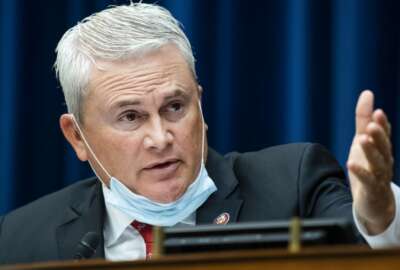Hubbard Radio Washington DC, LLC. All rights reserved. This website is not intended for users located within the European Economic Area.
Why is the Biden Administration taking so long to staff up?
The Biden administration is moving at a snail's pace to staff itself — slower, in fact, than the last three administrations.
Best listening experience is on Chrome, Firefox or Safari. Subscribe to Federal Drive’s daily audio interviews on Apple Podcasts or PodcastOne.
The Biden administration is moving at a snail’s pace to staff itself. Slower in fact than the last three administrations. That’s according to analysis done by Katie Tenpas, a nonresident senior fellow at the Brookings Institution. The Federal Drive with Tom Temin spoke to Tenpas about her findings.
Interview transcript:
Tom Temin: Miss Tenpas, good to have you back.
Katie Tenpas: Thank you very much for inviting me. I’m happy to be here.
Tom Temin: And at this time, a few years ago, we were talking about the turnover in the Trump administration. Now we’re talking about, well, it’s surprising to hear, I guess, if you add it all up, that the Biden administration is moving so slowly, especially after they issued something like 3000 executive orders in six days,
Katie Tenpas: Well, I would actually re-characterize it in that the Biden administration isn’t moving so slowly, there are actually hundreds of nominations that are pending before the Senate. The problem is the other side of the coin, which is the Senate’s ability to confirm these nominees that serve at the highest position across the 15 executive departments. So that’s my data set. I’m only looking at those Senate-confirmed appointments that are across the 15 major executive departments. And what I find, going back to George W. Bush, is that the pace of the Biden administration confirmation is slower than his three predecessors by a large degree in some cases. So for example, Obama, by the 300th day, almost had double the number of confirmations, and Biden had a mere 140 confirmations after 300 days. And again, it’s not necessarily the Biden administration not staffing — they have actually sent hundreds of nominations to the Senate. It’s the processing that’s occurring at the Senate level that’s difficult. I really don’t put the blame on the Senate. I think that there are lots of factors that play into this. And one of them is that the agenda of the Senate has been rather robust this term. It’s not as though they’re not doing anything, they’ve actually accomplished a great deal. And every four or every eight years, the Senate is required not only to maintain the regular pace of their workload, but to add on hundreds of nominations. There are roughly 1200 jobs in the federal government that require the Senate confirmation. And that’s just the civilian jobs. There are a whole slew of military jobs that also require confirmation. So the Senate, you know, just has to work at an even faster pace in this first year of a new administration. And that’s where I think that there’s a little bit of a problem in terms of bringing many of these nominees up for a vote. So a lot of these people are sort of stalled in limbo as they await their either committee hearing or they await the full vote in the Senate.
Tom Temin: Well, that makes a lot of sense, because I think, given the other activities of the administration early on this year, it did seem as if they were well prepared to govern when they came in.
Katie Tenpas: Oh, absolutely. It was one of the best transitions, I think, in the history of presidential transitions. And part of it stems from the fact that they all had experience. Biden had been the vice president, he had been in the Senate before. And one thing they did, I think they actually anticipated that the Senate would work slowly. And so what they did is, in the period between the election and the inauguration, they had agency review teams that went to all the major departments, and they identified individuals that could serve as actings, meaning they were temporarily holding leadership positions across the executive branch. They identified these individuals, some of them have been been nominated for those jobs. But in anticipation of the fact that the process would move slowly, they actually have people at the helm across the government. The only issue is that some of them, or many of them, are not confirmed. And so there are different types of powers that you have once you are fully confirmed by the Senate. So there are some limitations in your leadership. And of course, it makes it difficult for many of these offices and departments to have any sort of long term planning when they don’t have a permanent leader in place. So it’s not ideal, but I think the Biden administration did the best they could in terms of trying to identify people to at least be temporary leaders across the federal government.
Tom Temin: And of all these unconfirmed people that have been nominated, do they tend to cluster in certain areas? Or is it across the board?
Katie Tenpas: Yeah, that’s a really good question. I’ve actually drilled down into the data within the 15 departments and compared that historically. And the area where there’s sort of the least amount of confirmed leadership positions, it’s in the State Department, and it’s really bad. The number of Biden appointees that have been confirmed in the State Department pales in comparison to his predecessors. And that’s unfortunate, because I think it’s important for the United States to have leadership across the world. I mean, right now, there’s conflicts in China, there could be a potential conflict in Ukraine. Apparently, there are no African ambassadors. It just, by comparison, I’ll just throw out some numbers. After 300 days, President Biden had 27 confirmed State Department individuals. Compare that to George W. Bush 20 years ago had 133. Barack Obama had 92 and Donald Trump has 55. So 27 is not so great. I think it’s partly because there have been some holes placed by Senators Ted Cruz and Josh Hawley and Marco Rubio. So there’s a little bit of a Republican blockade, and that’s why I think the State Department is doing worse than any of the other 15 departments.
Tom Temin: We’re speaking with Katie Tenpas, she’s a nonresident senior fellow at the Brookings Institution. And you brought up my next question — sometimes even if you get past the Senate’s ability to process, there are political issues that hold up a certain number of people. And that is the case of State Department. In the case of, say, comptroller of the currency, a hugely controversial candidate had to withdraw. Similarly, early on at the Office of Management and Budget, someone hugely controversial. And that gets a lot of headlines. Are the people at the State Department on hold because of them? Or because, as they sometimes do, the senators have some other hair across their backside they want to fix.
Katie Tenpas: It’s foreign policy issues, but it’s not related to these individual nominees. They themselves are not controversial. The senators are objecting, so for instance, Josh Hawley is objecting to the withdraw from Afghanistan, and wants Tony Blinken and Jake Sullivan, he wants their resignations. Well, that’s just not going to happen. So at some point, I guess he’ll soften his stance. But you know, again, that’s nothing about the individual nominees or their qualifications. It’s simply about a broader objection to a Biden administration action. And that’s what’s happening.
Tom Temin: And so there’s really nothing the administration can do in that case, can it?
Katie Tenpas: Well, there are actually a couple of Republican senators who are saying, come on, I’m getting a lot of complaints from abroad. This is important for the United States to have diplomatic representation across the world. And, you know, you’re not going to get the Biden administration to force the resignation of two major appointees. So let’s just move on. And, of course, the Democrats are trying to put pressure as well, that requires more Republicans to sort of pressure their own party members to say, Come on, we have to move on from this. But the numbers are just stark. I mean, this is bad.
Tom Temin: Yes.
Katie Tenpas: This is way behind where we should be at the 300 day mark, which was November 17.
Tom Temin: And not withstanding that there are some career people who are, as you pointed out, they were identified to be able to stand in. That’s not quite the same in terms of getting your policy objectives done, is it? As having the confirmed person.
Katie Tenpas: Right. I mean, the federal government should be run by people who have gone through this arduous vetting process being confirmed by the Senate, it should not be filled by people who are in acting positions, in part because those people don’t hold all the authority to run those departments. And it’s very difficult for the people who work in those departments to have any type of long term planning, because they’re not sure what the eventual secretary of their department will want. And so it stifles their long-term planning. And I think it’s also bad for morale and creates, you know, a low level of anxiety. People don’t know what to expect; they don’t know when the nominee will be confirmed. It just creates too much uncertainty. And, and one of the things that happens in this country that’s very unusual — and I think it’s worth pointing out because we just sort of think this is normal — but every four, every eight years, we toss out the very top level of our government and put in new people. Other countries don’t do that. They have a much smaller number of political appointees, and nor do they have our system with the confirmation through the Senate. But we basically lop off the top of the pyramid and say, here, start over and fill roughly 1200 positions. They’re not just any positions — these are the absolute most senior positions across the 15 departments in the federal government. And there are other positions as well, like you mentioned, the comptroller of the currency and OMB. But we have this unusual exercise. And I think that that sort of makes it difficult for any sort of continuity. I think it makes it difficult for a president. One of the things they get to do, so to speak, is identify individuals that sort of believe in the same message, or the same governmental philosophy, and have them run these departments. But if you’re stalled by a Senate who is either unwilling to confirm them, or very slow to confirm them, it makes it difficult for you as president to steer the ship of state and the direction that you want it to go. Our government, generally speaking, is inclined toward status quo. So if you want to make changes, typically they’re at a low level change. But if you don’t have your leadership in place, it makes it all the more difficult to do that.
Tom Temin: And I guess one bright note in all of this, of the 140 people that have gotten through in the Biden administration, 50% of them are women.
Katie Tenpas: Right, the diversity is, you know, historic. And I think, you know, on the one hand, the pace is slow, but on the other hand, people, you know, it’s incredible. There are roughly 39% of the Biden nominees are nonwhite, which again, is another record. So I think we need to apply the diversity, but at the same time, I am an advocate of figuring out ways to expedite the confirmation process, in part because you might remember the 9/11 commission that wrote that report, and one of the things that they faulted was that President Bush had only had his team in place in some of these key departments as of June or July of 2001. And right now, I’m thinking boy, that would be great if President Biden had his team in place as of July, but they were sort of, the 9/11 Commission was making the point that something needs to be done to expedite the national security positions especially, and to get these individuals confirmed as quickly as possible, because this first year in office is kind of a weak link. It creates a lot of vulnerability. So I think we need to rise above politics in some respects and come up with some sort of system at the beginning of a new administration. I’m not saying every year but I’m saying at the beginning of a new administration that expedites the confirmation process and respects the fact that leadership is important and that temporary leadership is not a solution. So I’m not really sure what the answer is. I do know that when I looked at the 100 day progress point, roughly of that 100 day period — so it was Biden’s 100th day — the Senate had been in session less than 50 days. There had been recesses. I think that in a first year, there needs to be more of a focus that the Senate should be required to achieve a threshold of nominations and confirmations before certain recesses get enacted. And I realized that’s pie in the sky. The Senate is an individual branch, they would never want to employ that on themselves. But someone needs to really bring this to the fore before some event happens or something that reflects the fact that we were vulnerable. And that’s why a particular crisis or what have you occurred. We need to take it more seriously and it needs to move at a faster clip.
Tom Temin: Katie Tenpas is a nonresident Senior Fellow at the Brookings Institution. Thanks so much for joining me.
Katie Tenpas: You’re welcome. It was a pleasure.
Copyright © 2024 Federal News Network. All rights reserved. This website is not intended for users located within the European Economic Area.
Tom Temin
Tom Temin is host of the Federal Drive and has been providing insight on federal technology and management issues for more than 30 years.
Follow @tteminWFED





